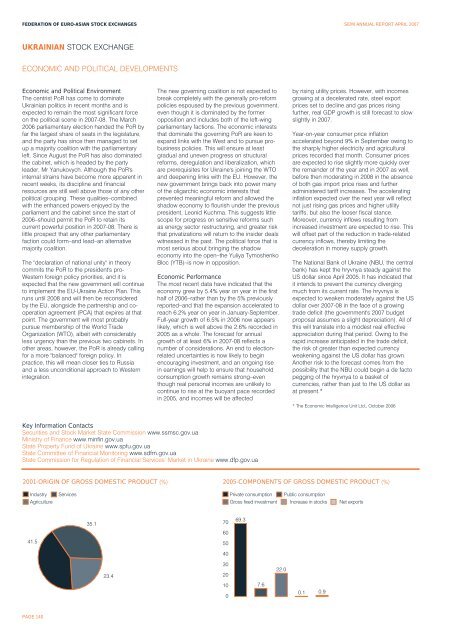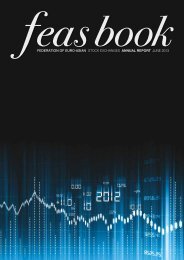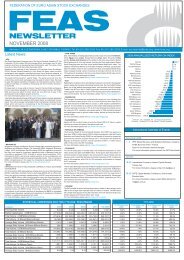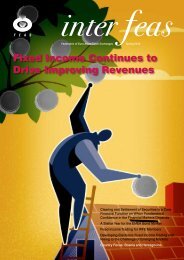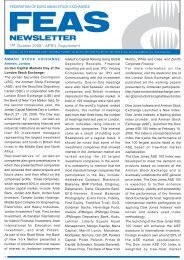Download - FEAS
Download - FEAS
Download - FEAS
Create successful ePaper yourself
Turn your PDF publications into a flip-book with our unique Google optimized e-Paper software.
FEDERATION OF EURO-ASIAN STOCK EXCHANGES SEMI ANNUAL REPORT APRIL 2007<br />
UKRAINIAN STOCK EXCHANGE<br />
ECONOMIC AND POLITICAL DEVELOPMENTS<br />
Economic and Political Environment<br />
The centrist PoR has come to dominate<br />
Ukrainian politics in recent months and is<br />
expected to remain the most significant force<br />
on the political scene in 2007-08. The March<br />
2006 parliamentary election handed the PoR by<br />
far the largest share of seats in the legislature,<br />
and the party has since then managed to set<br />
up a majority coalition with the parliamentary<br />
left. Since August the PoR has also dominated<br />
the cabinet, which is headed by the party<br />
leader, Mr Yanukovych. Although the PoR's<br />
internal strains have become more apparent in<br />
recent weeks, its discipline and financial<br />
resources are still well above those of any other<br />
political grouping. These qualities–combined<br />
with the enhanced powers enjoyed by the<br />
parliament and the cabinet since the start of<br />
2006–should permit the PoR to retain its<br />
current powerful position in 2007-08. There is<br />
little prospect that any other parliamentary<br />
faction could form–and lead–an alternative<br />
majority coalition.<br />
The "declaration of national unity" in theory<br />
commits the PoR to the president's pro-<br />
Western foreign policy priorities, and it is<br />
expected that the new government will continue<br />
to implement the EU-Ukraine Action Plan. This<br />
runs until 2008 and will then be reconsidered<br />
by the EU, alongside the partnership and cooperation<br />
agreement (PCA) that expires at that<br />
point. The government will most probably<br />
pursue membership of the World Trade<br />
Organization (WTO), albeit with considerably<br />
less urgency than the previous two cabinets. In<br />
other areas, however, the PoR is already calling<br />
for a more "balanced" foreign policy. In<br />
practice, this will mean closer ties to Russia<br />
and a less unconditional approach to Western<br />
integration.<br />
The new governing coalition is not expected to<br />
break completely with the generally pro-reform<br />
policies espoused by the previous government,<br />
even though it is dominated by the former<br />
opposition and includes both of the left-wing<br />
parliamentary factions. The economic interests<br />
that dominate the governing PoR are keen to<br />
expand links with the West and to pursue probusiness<br />
policies. This will ensure at least<br />
gradual and uneven progress on structural<br />
reforms, deregulation and liberalization, which<br />
are prerequisites for Ukraine's joining the WTO<br />
and deepening links with the EU. However, the<br />
new government brings back into power many<br />
of the oligarchic economic interests that<br />
prevented meaningful reform and allowed the<br />
shadow economy to flourish under the previous<br />
president, Leonid Kuchma. This suggests little<br />
scope for progress on sensitive reforms such<br />
as energy sector restructuring, and greater risk<br />
that privatizations will return to the insider deals<br />
witnessed in the past. The political force that is<br />
most serious about bringing the shadow<br />
economy into the open–the Yuliya Tymoshenko<br />
Bloc (YTB)–is now in opposition.<br />
Economic Performance<br />
The most recent data have indicated that the<br />
economy grew by 5.4% year on year in the first<br />
half of 2006–rather than by the 5% previously<br />
reported–and that the expansion accelerated to<br />
reach 6.2% year on year in January-September.<br />
Full-year growth of 6.5% in 2006 now appears<br />
likely, which is well above the 2.6% recorded in<br />
2005 as a whole. The forecast for annual<br />
growth of at least 6% in 2007-08 reflects a<br />
number of considerations. An end to electionrelated<br />
uncertainties is now likely to begin<br />
encouraging investment, and an ongoing rise<br />
in earnings will help to ensure that household<br />
consumption growth remains strong–even<br />
though real personal incomes are unlikely to<br />
continue to rise at the buoyant pace recorded<br />
in 2005, and incomes will be affected<br />
by rising utility prices. However, with incomes<br />
growing at a decelerated rate, steel export<br />
prices set to decline and gas prices rising<br />
further, real GDP growth is still forecast to slow<br />
slightly in 2007.<br />
Year-on-year consumer price inflation<br />
accelerated beyond 9% in September owing to<br />
the sharply higher electricity and agricultural<br />
prices recorded that month. Consumer prices<br />
are expected to rise slightly more quickly over<br />
the remainder of the year and in 2007 as well,<br />
before then moderating in 2008 in the absence<br />
of both gas import price rises and further<br />
administered tariff increases. The accelerating<br />
inflation expected over the next year will reflect<br />
not just rising gas prices and higher utility<br />
tariffs, but also the looser fiscal stance.<br />
Moreover, currency inflows resulting from<br />
increased investment are expected to rise. This<br />
will offset part of the reduction in trade-related<br />
currency inflows, thereby limiting the<br />
deceleration in money supply growth.<br />
The National Bank of Ukraine (NBU, the central<br />
bank) has kept the hryvnya steady against the<br />
US dollar since April 2005. It has indicated that<br />
it intends to prevent the currency diverging<br />
much from its current rate. The hryvnya is<br />
expected to weaken moderately against the US<br />
dollar over 2007-08 in the face of a growing<br />
trade deficit (the government's 2007 budget<br />
proposal assumes a slight depreciation). All of<br />
this will translate into a modest real effective<br />
appreciation during that period. Owing to the<br />
rapid increase anticipated in the trade deficit,<br />
the risk of greater than expected currency<br />
weakening against the US dollar has grown.<br />
Another risk to the forecast comes from the<br />
possibility that the NBU could begin a de facto<br />
pegging of the hryvnya to a basket of<br />
currencies, rather than just to the US dollar as<br />
at present.*<br />
* The Economic Intelligence Unit Ltd., October 2006<br />
Key Information Contacts<br />
Securities and Stock Market State Commission www.ssmsc.gov.ua<br />
Ministry of Finance www.minfin.gov.ua<br />
State Property Fund of Ukraine www.spfu.gov.ua<br />
State Committee of Financial Monitoring www.sdfm.gov.ua<br />
State Commission for Regulation of Financial Services’ Market in Ukraine www.dfp.gov.ua<br />
2001-ORIGIN OF GROSS DOMESTIC PRODUCT (%)<br />
2005-COMPONENTS OF GROSS DOMESTIC PRODUCT (%)<br />
Industry<br />
Services<br />
Private consumption<br />
Public consumption<br />
Agriculture<br />
Gross fixed investment<br />
Increase in stocks<br />
Net exports<br />
35.1<br />
70<br />
69.3<br />
60<br />
41.5<br />
50<br />
40<br />
23.4<br />
30<br />
20<br />
22.0<br />
10<br />
0<br />
7.6<br />
0.1 0.9<br />
PAGE 140


